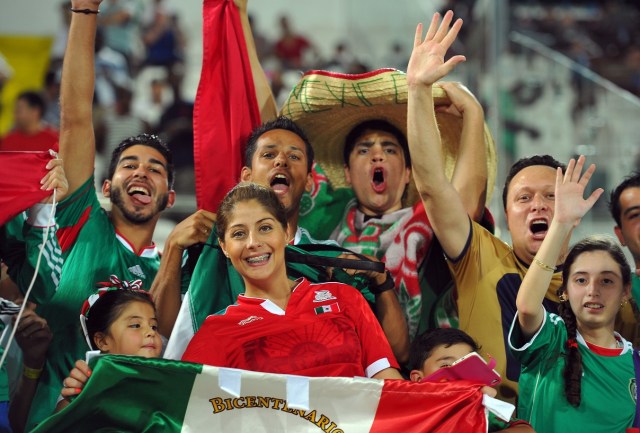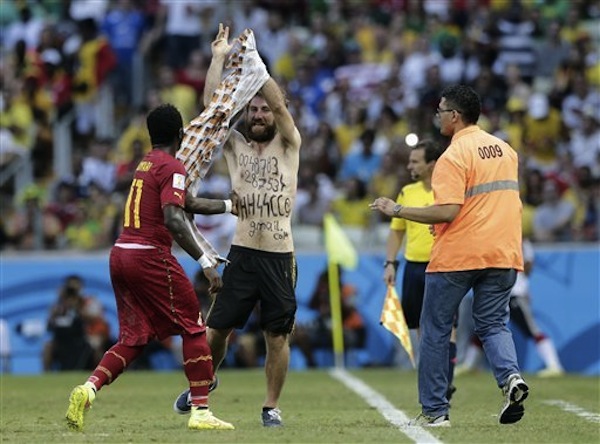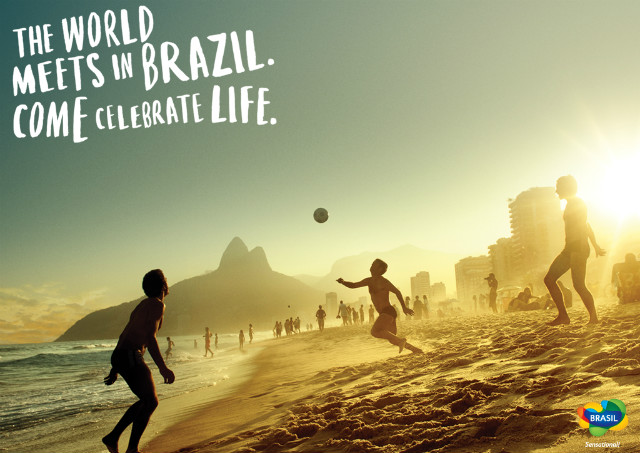Feature image via Funcheap
On Thursday, June 19th, FIFA announced that it was opening a case against Mexico to investigate the “improper conduct of spectators” a week earlier on June 13th, and on June 17th. The disciplinary proceedings began after allegations that Mexican spectators had used homophobic slurs during Mexico’s World Cup match against Cameroon and then later during the second match against Brazil. The organization also sought to punish Brazil for its fans’ use of homophobic slurs in retaliation against Mexican fans. However, only five days after FIFA announced the investigation, the organization has decided to drop all charges.
FIFA’s disciplinary panel explained that the chant issued by Mexican spectators “is not considered insulting in this specific context” and thus the investigation can be dropped. Indeed, there is a lot of disagreement about linguistic and cultural connotations of the word “puto,” which some Mexican soccer fans yell when an opposing team’s goalkeeper takes a kick. Hector Gonzalez Inarritu, chief operating officer of the Mexican national team, defended the chant as a cultural tradition, clarifying, “It is not aggression — it is something that we’ve had for a long time in the Mexican League and in international matches.” Others, like Piara Powar, a member of FARE (Football Against Racism in Europe) and the Committee Against Racism, condemned the homophobic gesture claiming that “FIFA has strong regulations in this regard. Zero tolerance is what is required here.”

When FIFA initially committed to taking action against Mexico and Brazil, officials asserted in a statement that “FIFA takes a firm, zero-tolerance stand against any form of discrimination or racism.” Furthermore, Brazilian President Dilma Rousseff and FIFA President Sepp Blatter publicly announced their intentions to use the World Cup as a “platform to fight racism and discrimination.” Contrary to what President Rousseff and Blatter may daydream about, the World Cup has been a site of discrimination for a while.
On a smaller scale, there have been a series of neo-Nazi gestures at World Cup matches. Although Mexico and Brazil have taken a lot of heat for homophobic chants, FIFA officials spoke out against Russian and Croatian fans who displayed neo-Nazi banners during their matches against South Korea and Brazil, respectively. Also, at the Ghana-Germany game on June 21st, a Nazi sympathizer rushed the field, removing his shirt to reveal a Nazi message scrawled in black against his chest. Other spectators donned blackface for the game. Article 3 of FIFA’s Statutes implies that legal action will be taken against discriminatory groups or individuals. The article defines forms of discrimination as:
“on account of race, skin color, ethnic, national or social origin, gender, language, religion, political opinion or any other opinion, wealth, birth or any other status, sexual orientation or any other reason.”
Nevertheless, FIFA has not made clear what actions — if any — it will take against Russia and Croatia.

via News Observer
While FIFA cannot be blamed for individual groups that bring their hatred across borders, the World Cup in and of itself is a symbol of discrimination. Brazilian protestors have brought attention to the government corruption, police brutality that has resulted in the loss of civilian lives, and the gentrification that has led to the displacement of poor and Black Brazilians, all in the name of promoting the World Cup. Brazil is not an isolated example of the discrimination and societal violences that take place to make the World Cup possible; because of the 2010 World Cup in South Africa, legislation like the “KwaZulu-Natal Elimination and Prevention of the Re-emergence of Slums Act” arose as a measure to “clean up” the KwaZulu-Natal province in time for the soccer tournament, but actually surfaced as a tactic that further marginalized imojondolo, or “shackdweller” communities and invoked apartheid policies.
National governments enter into an agreement with FIFA to make accommodations for the capitalist spectacle of the World Cup by any means necessary. FIFA endorses a false “zero tolerance” for discrimination, though the money that funds the organization is often tied to the marginalization of already-oppressed groups. Furthermore, its show of international, friendly competition is a masquerade that hides the prevalent power dynamics that govern how citizens of various nations relate to each other on a global level. Especially with respect to non-Western host countries, the World Cup turns these nations into tourist traps and business ventures where the only way the Western world is encouraged to relate to these countries is through a process of exotification and commodification.

The World Cup fans who have chosen to support their nations through homophobic and/or racist chants need to do better, and FIFA should be encouraged to continue its public condemnations of the oppressive behaviors demonstrated by the spectators. However, FIFA’s commitment to anti-discrimination work is a shallow pledge that only exists insomuch as FIFA can act as the judge to outside groups and individuals that threaten the image of the tournament. Where are FIFA’s anti-discrimination statutes when the governments who host the World Cup oppress the poor, and the Black and Brown people? FIFA’s so-called platform to fight discrimination and racism is rather short and shaky.








Comments
As a fan of Futbol and of Mexico, our chant is not towards anyone but the goalie. It has always been a tradition as long as I remember
The amount of bullsh*t that comes out of FIFA and Dilma’s mouth is unbelievable. I’m Brazilian and the Brazilian crowd has been the most homophobic and stupid of the World Cup, specially at the Spain matches. Everytime Diego Costa touched the ball the whole stadium start chanting “Diego faggot” (backstory: he’s Brazilian and after he said he was going to become a Spanish citizen so he could be at the World Cup the brazilian coach said that he had a “chance” to be at the Brazilian Team. He chose Spain anyway and some fans aren’t very supportive of his decision). Besides, in every soccer match in the country (State or national championship) there’s a player being called a faggot. So the “zero tolerance” is only for the foreign press to believe that they really care about this stuff. Well, they don’t. They only care about the money in their pockets. And don’t get me started on the corruption and the amount of money used to build the stadiums, specially because some of them will never be used again.
Does my comment show that I’m a little mad at my country?
As a fellow brazilian all I can guess is that FIFA realized that if they were to continue with the charges against the slur-chanting supporters they’d have to host crowdless matches. I don’t say that to belittle the crimes these people commit, as I’m one of many that suffer with it daily, but to highlight the fact that homophobia is so pathetically normalized within our sport world (and world-world) that, right now, it is completely, utterly, wholeheartedly impossible to avoid it during the WC matches. You probably get the picture of the problem, tho most outsiders will never truly grasp the actual situation – how much homophobia has been absorbed and is now claimed as part of “our culture”. Seriously, the average brazilian has been force-fed so much homophobic content it’s gotten to a point where our society is totaly insensible to it. They took “gayness” out of our hands and turned it into joke material, the lowest and most overused national curse. FIFA trying to sell the idea they’d be able to track down and punish prejudiced behavior is, in fact, nothing but trying to sell the idea they’d be able to cover the sun with a finger. Unrelatedly, is nice seeing another brazilian here (:
I was watching the USA-Ghana game in a bar here in Boston, and some girls at the next table starting saying racist shit about the Ghanaian players and fans. They said a really gung-ho fan who’d painted his face white was “praying to the tribal gods” (newsflash: most Ghanaians are Christians or Muslims…) and started chanting in a mock accent when they showed a Ghanaian player upset over the USA’s second goal. It realllllly put a damper on the excitement for me.
Racist and homophobic asshole fans, you aren’t doing ANYONE any favors. Even other people rooting for the same side.
I wonder if the mess that is the current World Cup will help FIFA reconsider holding it in Qatar in 2022.
I can’t say I’m holding my breath…
No of course they won’t, they got too much bribe from Qatar to want to give it back.
I remember a friend’s parents told me(kind of pridefully) that in his native Poland they would make monkey noises any time a darker skinned player had the ball. I later took a look on Wikipedia to discover most eastern European countries have some history of racism when it comes to football/soccer matches. It’s a shame really.
I’m a fan of futbol, but it’s culture has always irritated me, the fans always being so violent & cruel (throwing bananas at PoC men for example). And it’s not just homophobic things coming out from latin fans. The sports anchors on Univision tend to call some of the athletes, El Negrito/moreno/negro (the black person) and I sink in my seat in embarrassment when I see other latins defending it saying “we say it out of love” BS because other athletes get nicknames like sniper, or they have their names/numbers said, take the time to learn your athletes name & not just their dark skin complexion. And it’s not just white/latin people with the anti-blackness, fans from all over the world are wearing cornrow/dreads/afro wigs with their countries flag colours on it, so embarrassing.
Futbol has been fraught with homophobia, sexism, and racism for as long as I can remember. But, then again, so is society in general. I remember when I was very young I always got called a lesbian or worse words just because I liked futbol — watching it, playing it, wearing jerseys, video games, etc. “Be careful, this one will grow up to be a big lesbian” is something I got used to hearing over time. Guess they were right! For some reason beyond my comprehension futbol is equated with masculinity, and those of us who are female bodied and happen to love the sport get our sexuality relentlessly called into question.
The whole culture surrounding futbol is messed up because of so many resasons… But FIFA and the larger society does nothing about it *shakes my head*.
The issues at the world cup just represent a larger societal problem that we are nowhere close to addressing thoroughly and effectively. Lets just hope that there are some significant changes by the next two world cups (Russia and Qatar). But I won’t hold my breath on that.
~Ends rant.
I know when countries host events like the world cup and the olympics there are so many leftover unused stadiums. It would be nice to see them utilized in some way to serve the citizens of the country once the event is over. This is just an idea I had and I think it could work. The seating area could be turned into terraced garden beds and the main field area can be used for large plants. That way the country can grow their own food in plots, like a community garden. It would make it useful and productive and not just an eye sore reminding them how much money they lost hosting the event and how much political corruption it took to have that eye sore.
I have to say, that guy in Ghana-Germany game isn’t a neo nazi. He is Leszek Ludomir a sport fan. That message in his chest is his email (hh”44″cc@gmail.com)you can check on facebook. If he was a neo nazi do you think a ghana player could touch him ?? no way .
Thanks for writing about this. Worst of all is the fact that Russia will be hosting the next world cup despite the legal and societal oppression of LGBT identified people. And Qatar has an even worse human right record – women are afforded very little rights. I find any comments that FIFA makes on ending discrimination laughable in the face of them awarding (what is a super important sporting event) to countries that have such discriminatory laws and practices in place. And to then defend it by saying FIFA isn’t a political organization. Bull shit. South Africa was banned from participating in international sports due to apartheid for damn good reason.
Countries that don’t afford all their citizens equal rights have no business hosting the 2nd biggest sporting event in the world.
Thanks for this article. I’m not understanding why an act isn’t insulting or homophobic because it’s tradition and only targeted at one person.
It’s only insulting if there’s an interest behind it. Like that Dani Alves issue with the banana. His reaction was planned by a marketing agency and some people made money selling t-shirts with the hashtag they created here in Brazil. But while the players and fans were holding anti-racism signs at the stadiums, some players were being called faggots. If someday they profit from something related to homophobia they’ll start “fighting” it.
as a gay latina, i didn’t understand at all why the use of that particular word was offensive at all. i have never heard “puto/a” used as a homophobic slur. hell i’ve even used the word from time to time. i understand why FIFA didn’t take action. it’s not super nice but neither are most soccer/futbol chants.
I just don’t see it as a big issue because it’s part of our chant. So screw those people who are offended
My business partners wanted a form earlier this week and were informed about a great service that hosts an online forms library . If you need to fill out it too , here’s https://goo.gl/FlKYE0.